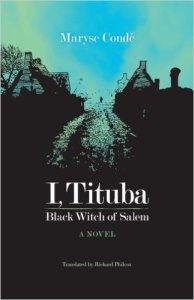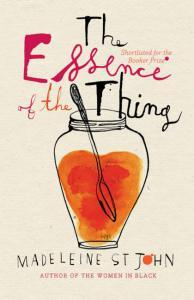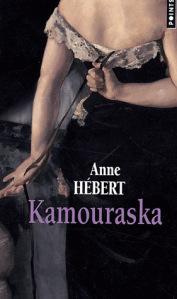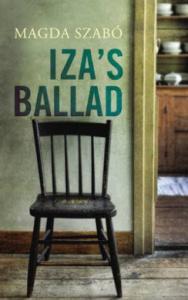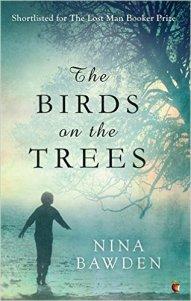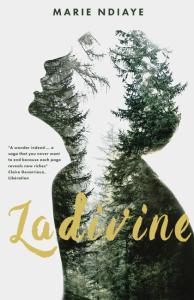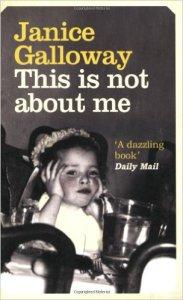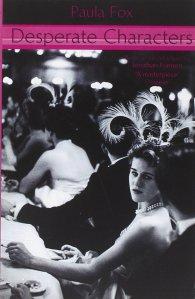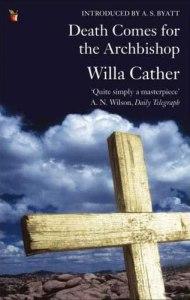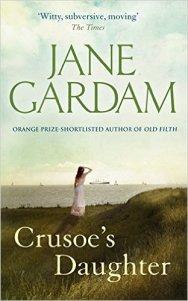Okay so my tooth comes out next Thursday, and I don’t want to think about that, so something completely different. A few weeks ago, I saw a post doing the rounds about 11 Brilliant Female Authors You’ve Never Heard Of, and naturally I was interested. I agreed the authors were brilliant, but I didn’t think they were all that obscure. And of course that got me thinking about the sort of list I might put together on similar lines… The following authors are, I think, less well-known than those on the original list, but that doesn’t mean you won’t have heard of some of them, or indeed read them. Mostly these things depend on geography and how keen you are on female authors!
Maryse Condé
Born in Guadeloupe in 1937, Condé’s native language is French and that’s what she writes in, but most of her career has been spent in America in academia. Her novels are deeply concerned with gender, race and culture and often they are historical, like my favourite,
I, Tituba; Black Witch of Salem. She had a particular interest in the African diaspora, especially in the Caribbean, and everything she writes has a sharp political edge. But saying these things doesn’t really connect with the heart of her writing, which is just so vivid and vibrant.
Tituba, for instance, is about a young slave girl who escapes her life of hardship to come to America where she gets mixed up in the Salem witch trials because she is black and her cultural beliefs as well as her medical knowledge, are different to the norm. It’s completely engrossing, but it captures the reader’s mind as well as heart.
Madeleine St John
Madeleine St John is an Australian writer who’s been shortlisted for the Booker before (in 1997 for
The Essence of the Thing) so she ought to be better known than she is. She seems to have this ability to slide off the radar, despite the wonderfully funny, accessible, sparklingly clever novels she writes. She’s got a most intriguing writing history, having spent eight years trying to write a biography of the spirit medium, Helena Blavatsky, and eventually destroying the manuscript in frustration. She finally turned to writing novels in the early 1990s and was successful but found herself deeply uncomfortable with the publicity that brought, which turned her almost into a recluse. Alas, she is with us no more, having died in 2006, but she leaves behind four wonderful novels (though her will stipulates that none shall ever be translated):
The Women in Black,
A Pure, Clear Light,
The Essence of the Thing,
A Stairway to Paradise.
Anne Hébert
Born in Quebec in 1916, Hébert had a terrifically successful career in Canada, winning The Governor General’s Award three times, but doesn’t seem to be particularly well known beyond her native borders. She was an equally brilliant poet and novelist though she had to self-publish a couple of her early works in order to break into the literary scene. In her personal life she lost two people she was close to – her cousin and her sister – in sudden and violent illness and this very much shaped her poetic imagination. My favorite of her novels is
Kamouraska, set in the 19th century, in which the female protagonist conspires with her lover, a doctor, to kill her husband. It’s based on a true story which possibly adds to the kick it gives, but it’s the atmosphere of the novel I’ve never forgotten, a sort of intense fever dream that manages nevertheless to ask some tough questions about love and morality.
Magda Szabó
Szabó was a Hungarian writer whose writing was suppressed during the Stalinist rule from 1949 to 1956. She began her career as a poet, her second book of poetry winning the Baumgarten prize which was taken away from her for political reasons on the day it was awarded. During the years that followed she turned to writing novels and from 1958 until her death in 2007 was a revered literary figure. Her novels are gradually coming back into print in English.
The Door, the story of the relationship between a writer and her house cleaner, was shortlisted for a number of prizes and turned into a film. Just recently,
Iza’s Ballad was translated into English and published, the touching story of an elderly widow attempting and failing to escape the well-meaning but claustrophobic love of her daughter. Her stories are simple, but the depth of characterisation, the psychological insight and the quality of the writing are amazing.
Nina Bawden
Nina Bawden is better known as a children’s writer –
Carrie’s War or
The Peppermint Pig, anyone? – but she also wrote elegant, austere and psychologically piercing novels, too.
Circles of Deceit was shortlisted for the Booker in 1987, and in 2010
The Birds on the Trees made the shortlist for the Lost Man Booker Prize. She had a life that seems marred by tragedy, losing a son to suicide, a daughter who died six months before Nina Bawden died herself, and a second husband killed in a train crash in which she was also badly injured. Yet over her lifetime she wrote 55 books. She’s a writer I would rate as highly as Penelope Mortimer or Elaine Dundy yet she seems to be sliding into obscurity at the moment. Time for an enterprising publisher to bring her work back into print.
Marie NDiaye
Given that NDiaye has been longlisted for this years International Man Booker with her novel
Ladivine, I imagine that her name is much better known than it was a few months or so ago. If you live in France, there’s no doubt you’ll have heard of her. NDiaye is a prodigy, publishing her first novel at the age of 17 and winning the Prix Femina in 2001 for
Rosie Carpe and the Prix Goncourt in 2009 for
Three Strong Women. Her father is Senegalese (and he returned there when she was a baby, leaving her to be brought up by her mother) and one of her concerns is the situation of immigrants in metropolitan Paris, though she writes essentially about identity in the broadest sense. In her most recent novel, the female protagonist’s problems all arise because she can’t bear to admit that her mother was a poor, black housekeeper, and instead claims she is an orphan. My favorite of her novels is
Rosie Carpe, though it won’t be to everyone’s taste. NDiaye had a strong interest in a delicate kind of magical realism (not a bit like the Latin American version – you’d have to read her to see why) and I find her novels completely entrancing.
Janice Galloway
Scottish writer, Janice Galloway, is – or at least was in her first three novels – what you might call an experimental or innovative writer. This gives some authors a bad name, like they might be pretentious. But Galloway’s down-to-earth female characters are anything but that. Her first novel,
The Trick Is To Keep Breathing, is a funny and terrifying account of a descent into mental illness, and that doesn’t sound too appealing either. But if you like Ali Smith, and you get that sharp-edged, black-humoured, rigorous and yet musical Scottish style, you’ll love her. Galloway’s recent volumes of memoir,
This Is Not About Me and
All Made Up are excellent places for cautious readers to begin, and I urge you to try her because she has a wonderful voice.
Paula Fox
Paula Fox has reached the grand age of 92, which is long enough on the earth to have a great career, get forgotten and then be revived again. She was a highly successful children’s author, but I know her from her novel,
Desperate Characters and her memoir,
Borrowed Finery. Fox was abandoned at birth by her mother and put in a foundling home. Rescued by her grandmother who couldn’t look after her, she was placed in a series of households, the first belonging to a kindly Reverend who gave her a decent start in life. She worked as a teacher and a mentor for troubled youngsters, so no wonder she went on to write children’s literature, though she was in her 40s before she began to write seriously. She was also writing novels with mixed success; these were all critically acclaimed but sold poorly. Goodness only knows why, for she’s an amazing writer. In 2011 she was placed in the New York State Writers’ Hall of Fame, and thanks to being championed by Jonathan Franzen, some of her work is now being reissued.
Willa Cather
Now if you live in America, Willa Cather is going to be a very familiar name to you. However, I don’t think her works have ever become truly widely known outside of the States. And this is madness, because Cather is completely brilliant, probably my favorite prose stylist of all (okay, maybe tied with Colette). She is best known for her ‘prairie novels’,
O Pioneers! and My Antonia, but I much prefer the run of novels that followed:
Death Comes for the Archbishop,
My Mortal Enemy,
The Professor’s House,
A Lost Lady. Cather really hit her stride in mid-career, and may have continued writing brilliantly right up to her death if critical opinion hadn’t turned against her, something that upset her deeply. Critics have a lot to answer for, in fact, as her work was taken up again by the feminists after her death (Cather was known for cross-dressing and having only significant female friends) and sort of mutilated once again, stuck under yet another label that narrowed her literary accomplishment. If you haven’t ever read her, pick up her novels. She is outstanding.
Jane Gardam
Another name that will be very familiar to some, Gardam is a British writer whose recent trilogy of novels,
Old Filth,
The Man in the Wooden Hat and
Last Friends have definitely had some critical and commercial recognition. But Gardam has been writing for donkey’s years, and the novels from the early part of her career are every bit as wonderful and worth your time. I remember reading
Bilgewater in my early 20s when it was one of the first coming-of-age novels I’d come across and being hugely impressed by it. She began writing in her 40s when her children had grown up enough for her to have time to herself, and from that moment on she was highly prolific. She is the only writer to have won the Whitbread Prize for best novel twice – for
The Hollow Land in 1981 and
Queen of the Tambourine in 1991. She was shortlisted for the Booker in 1978 for
God on the Rocks. And yet despite the critical acclaim, I don’t think she is as well-known as she deserves to be. It’s like her zenith has passed, but that would be premature; start with
Old Filth or
Crusoe’s Daughter if you’ve never read her before.
And feel free to mention any other brilliant women writers who you think should be better known!
